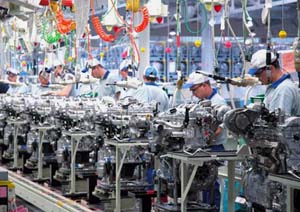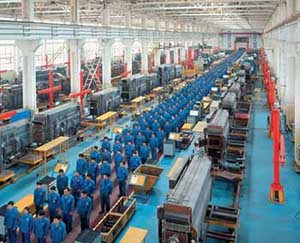 |
Organic Society
Organic Society & Capitalism - Part I
Critique of Capitalism
from an Organic Perspective
Plinio Corrêa de Oliveira
When analyzing today’s currents on the left, one sees that they attack all forms of private properties in a general critique of Capitalism. They draw attention to one or another incorrect aspect of Capitalism, become experts in attacking such points, and then apply such critique to every form of property to try to destroy it. This is clearly a sophism.

Instead of seeking a stable property proportionate to his personality, the capitalist mentality wants a bank account |
By Natural Law a man has the right to have private property: a land, a house - immobile goods - and then everything that he puts on it or in it - mobile goods. This basic right generates a man’s right to own the fruits of his land or to demand rent for his house. He also has the right to accumulate sufficient material means to provide for himself and his family not only for the immediate future, but for many years, even for generations. This provision should satisfy not only for his material needs, but also for his social needs. He should have, therefore, sufficient means to maintain himself and his family at the social level to which they belong. He also has the right to transmit his patrimony to his children, who, in their turn, have the right to inherit it.
These rights are perfectly legitimate according to Natural Law and make up part of the Social Doctrine of the Church. So, these rights that existed long before modern Capitalism, constitute its correct part. Any impartial critique of it should first acknowledge that these rights are legitimate and that Captitalism per se does not violate such rights.
In this topic of Organic Society, we have examined the healthy constitution of the medieval guilds, which in many ways apply principles that can also constitute part of a legitimate Capitalism. For example, a weaver needs to have a certain amount of money put aside in order to buy cotton, wool or linen in the right season to produce the goods his shop offers throughout the year. Nothing is wrong with setting aside this capital for the future.
The Church has taught many times that the system of employer-employee is per se legitimate. It supposes that the owner of the farm or factory sets aside capital to support the needs of the enterprise - employee salaries, maintenance of the means of production, and a proportionate and moderate growth.
A farm or a factory should remain within certain human limits so that the employees are not treated like parts of a machine in their work environment. Also, the salary should be sufficient for the employee to provide for himself and his family so that his wife is not forced to leave the home to work but can oversee the good formation of his children. Abuses occur when the employer transgresses these limits and does not pay the employee what he needs. Catholic Social Doctrine teaches principles that instruct the employer to be just and human toward his employees, and the latter to be obedient and docile toward their superiors. The abuses, which should always be corrected as much as possible, do not change the essence of the system. The salary system is legitimate.
It is also legitimate for a salesman to take a proportionate commission of his sales. He is a useful intermediary for both the one who wants to buy some good or property and the one who wants to sell it; therefore it is just for him to financially benefit from his skills.
Finally, the Church also approves the practice of lending money but fixes a limit on the lender’s profit. In this regard, according to the 1917 Code of Canon Law, a Catholic may follow the rate of interest established by the civil law of his country, insofar as it is not excessive. If someone passes this limit, he is practicing usury, which is a moral crime that was punished by many civil laws of Catholic States. So here also, so long as the proper limit is observed, this facet of Capitalism is morally correct.
Money speculation
I believe that a primary fault in modern Capitalism is the practice of using the money someone saved and deposited in a bank to produce price fluctuations in the market, enabling a small group of persons to profit from it.
There is no link whatsoever between this profit and any organic source of production or service for society. It is merely money speculation to produce more money. This game only benefits those who have the know-how about such fluctuations. Today’s Capitalism, in a large measure, feeds on this bad practice. I believe it is completely wrong and should be prohibited in a Catholic society.
It is one thing to say it is wrong; it is another to know how to prohibit it. I don’t know any penal code that forbids such speculation. Here I point out the problem in order to study and define it rather than to present a definitive solution. What can the State do to prevent such action? What can the Church do? It is a topic that needs more study.
I think that the more profound solution to this problem would involve a change of mentality. But I will deal with this a little later.
Riches and money
An elementary practical way to avoid this accumulation of money: If a man wants to sell his house, he signs a contract with the buyer before a notary. That paper, the contract, is worth the price of the house. The owner cannot sell that same house to another person and issue another contract without committing fraud. The same moral criterion applies to the circulation of money. When a government prints bills, it is selling to the people the riches of the country - be it gold, silver or other such assets that it keeps in reserve. Thus, each recipient of those bills owns a part of the assets of the country. If no riches exist behind that paper, it is fraudulent.
I believe that many countries print several times the quantity of money they should. This fraudulent money also ends in banks, feeding those money-speculations we are condemning. However, even when the natural riches/bills proportion is maintained, there is still a large amount of money in circulation that ends by being used by the banks or other financial organizations for speculation.
There is a defect in the modern mentality that creates the need for the bank. The modern man has a wrong ideal of life. Instead of striving to have a stable house nicely arranged with good furniture and pieces of art and engaging in leisure pursuits appropriate to the development of his personality, he thinks that the only thing that counts in life is to have money. When he has enough money, then he may momentarily enjoy part of it just for himself. For example, he goes to the Bahamas to enjoy some days of vacation, his only future reminder of the event being the many pictures he took. A consequence of this mentality is that he feels the need to accumulate his money in secure places until the moment comes to enjoy it or multiply it through speculation. So, the bank becomes indispensable. As we pointed out before, the real solution involves a change in mentality.
Macro-enterprises
Another incorrect aspect of Capitalism – of which I have seen fewer critiques - refers to the size of businesses. Observing some macro-enterprises, one realizes that, in practice, they operate like socialist units inside the State. They are socialist in their system of mass-production, with employees surrounded by machines 8 hours a day, 11 months a year. This environment forms a materialist mentality. I believe that one of the secrets of the success of China in replacing the Western work force is that the macro-enterprise method of production is for the most part socialist, very similar to communist methods. So, it is easier for a communist country to replace it.

A U.S. production line, above, does not differ significantly from the communist workers in China, below
 |
Those macro-businesses become so powerful that they begin to dictate the market prices of their products. This is accomplished through advertising techniques to influence people to buy their goods, tactics that are increasingly used to change the customs of a people - and never for the better. The general tendency of such propaganda is to create egalitarian and sensual customs. It promotes egalitarianism between father and son, superior and inferior, man and woman, rich and poor, etc. It spreads a sensuality that openly promotes immorality, and today we see it is encouraging the vices against nature such as homosexuality, incest, sadism and masochism.
When we have two or three macro-businesses scuffling to sell similar products, the public becomes so seduced by the propaganda that it feels almost obliged to choose one of the products offered rather than to reject them all. A practical destruction of the will and the massification of persons are the deleterious consequences of this market fight, a massification that necessarily leads to Socialism. This is the way macro-Capitalism prepares society for Socialism and Communism.
I believe the Church must teach guidelines to keep businesses within certain limits so that the organic characteristics of a people do not disappear. As a point of reference, it is my opinion that what is normally called a limited company has a human size; what is called an anonymous corporation already surpasses the limits and leads to massification.
Needless to say, the macro-business relies on the bank, which lends it money to grow beyond its proportion and to sustain it in bad times. In practice, the defects of both the bank and the macro-business feed each other.
With this we make a first critique of Capitalism. In the next article we will further analyze it, and discuss possible solutions for these problems.

Posted August 11, 2008
Continued

  | | Prof. Plinio |
Organic Society was a theme dear to the late Prof. Plinio Corrêa de Oliveira. He addressed this topic on countless occasions during his life - at times in lectures for the formation of his disciples, at times in meetings with friends who gathered to study the social aspects and history of Christendom, at times just in passing.
Atila S. Guimarães selected excerpts of these lectures and conversations from the trancripts of tapes and his own personal notes. He translated and adapted them into articles for the TIA website. In these texts fidelity to the original ideas and words is kept as much as possible.

Related Topics of Interest
 The Role of Economy in the Collapse of the Medieval Mentality The Role of Economy in the Collapse of the Medieval Mentality
 The Decay of the Medieval Guilds The Decay of the Medieval Guilds
 Proportion between the City and the Man Proportion between the City and the Man
 Clans and Human Types Clans and Human Types
 Vocations of the European Peoples Vocations of the European Peoples
 Revolution and Counter-Revolution in the Tendencies, Ideas, and Facts Revolution and Counter-Revolution in the Tendencies, Ideas, and Facts

|
Organic Society | Social-Political | Home | Books | CDs | Search | Contact Us

© 2002-
Tradition in Action, Inc. All Rights Reserved
|
 |
|